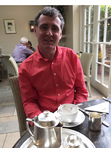Prophet Song by Paul Lynch – Fighting the Wrong War

Prophet Song is a novel by Irish author Paul Lynch, winner of the 2023 Booker Prize.
This book imagines Ireland, taken over by a repressive regime, descending into civil war and anarchy. We witness events through the eyes of a woman whose husband is one of the first people to be ‘disappeared’ as the government ramps up oppressive measures.
The story, told in the present tense, has the feel of a movie filmed in one long take. Some parts of it rang true for me – a political party with repressive instincts wins an election, installs sympathisers in prominent official positions, and so becomes a dictatorship. To a certain extent this sort of thing has already happened. There was also a feeling of truth in the suggestion that once the totalitarian rot begins, going back is not easy. Without peaceful transfer of power, the only way to overthrow a government is through violent means, and one lot of violence isn’t much better than another. This gave rise to some fatalistic philosophising, suggesting that societies go through cycles of light and darkness, and there’s not much we can do about it.
Other aspects of Prophet Song were less believable. My reservations focused on the nature of Ireland’s imagined regime, where the state is a faceless, inhuman machine swallowing up individuals. This was like reading a dystopian novel from the 1950s. Against a background of Soviet Russia, and recent experience of Hitler’s Germany, the oppressive states described in books like Nineteen Eighty-Four and Fahrenheit 451 were a reaction to their times. But the situation in western countries in the 2020s is different. Modern would-be dictators tend to be highly visible populists. They are hostile to state institutions, presenting them as enemies of personal freedom. The problem is not so much the state, more the wayward individual who, seeking personal aggrandisement at all costs, finds the moderating influence of state institutions standing in their way. And in fact, even back in the day of famously dark twentieth century novels, the individual may have been a bigger problem than is generally allowed. Repression is often linked to a single, deranged person, whether that’s Hitler or Stalin, or a more recent wannabe. Even the oppressive regime in Nineteen Eighty-Four centres itself on the idea of an individual – Big Brother. In Prophet Song there is no such figure. There is just ‘the state’.
Perhaps it is our desire to see the world in personal terms that helps an inappropriate individual into a position of authority. People identify with a familiar face rather than a department of policy experts. Fame is the major determinant of political success, not competence. We need to rethink that. The struggle today is not with a faceless state, but with the well known faces of people who are unsuited to their position of public responsibility. The men and women who work for the state, unsung civil servants, scientific advisors, administrators of museum and arts funding, social security officials, teachers, health workers – are they really the problem? Nothing is perfect, but if anyone is fighting the good fight, it is usually them.
Prophet Song does not address such complications. In many ways it is engaged in a battle that does not apply anymore. The book reminded me of an idea attributed to Georges Clemenceau, French Prime Minister during World War One. Clemenceau is supposed to have said that generals are always prepared to fight the previous war, not the current one. Sometimes this applies to novels as well.



